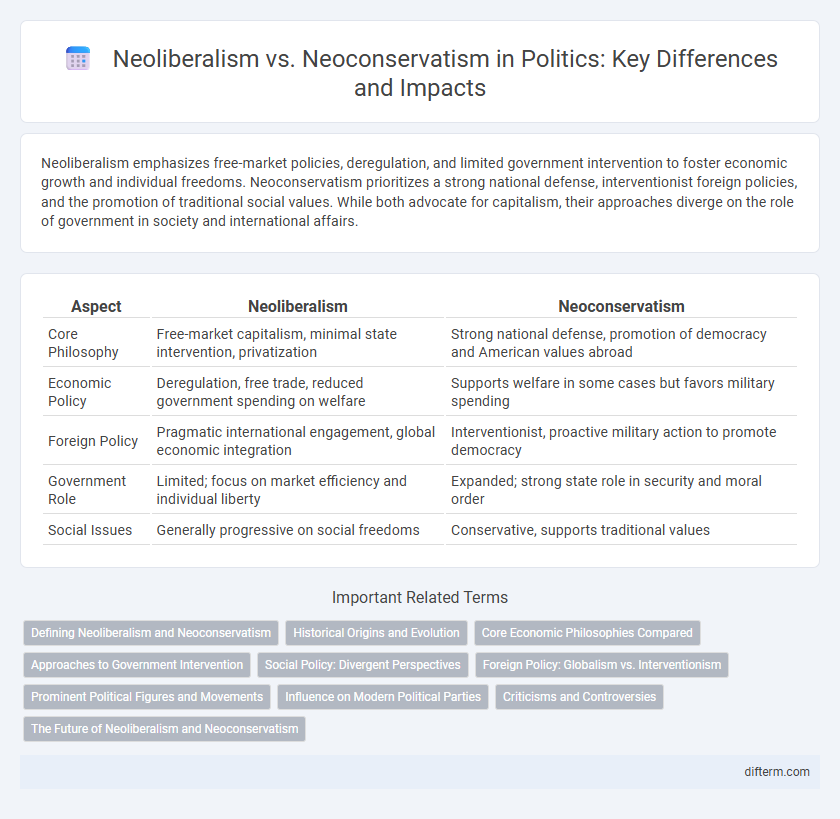Neoliberalism emphasizes free-market policies, deregulation, and limited government intervention to foster economic growth and individual freedoms. Neoconservatism prioritizes a strong national defense, interventionist foreign policies, and the promotion of traditional social values. While both advocate for capitalism, their approaches diverge on the role of government in society and international affairs.
Table of Comparison
| Aspect | Neoliberalism | Neoconservatism |
|---|---|---|
| Core Philosophy | Free-market capitalism, minimal state intervention, privatization | Strong national defense, promotion of democracy and American values abroad |
| Economic Policy | Deregulation, free trade, reduced government spending on welfare | Supports welfare in some cases but favors military spending |
| Foreign Policy | Pragmatic international engagement, global economic integration | Interventionist, proactive military action to promote democracy |
| Government Role | Limited; focus on market efficiency and individual liberty | Expanded; strong state role in security and moral order |
| Social Issues | Generally progressive on social freedoms | Conservative, supports traditional values |
Defining Neoliberalism and Neoconservatism
Neoliberalism emphasizes free-market capitalism, deregulation, and reduction of government intervention to promote economic growth and individual freedoms. Neoconservatism prioritizes a strong national defense, promotion of democracy abroad, and traditional social values combined with a proactive foreign policy. Both ideologies diverge significantly: neoliberalism centers on economic liberalization, while neoconservatism is rooted in interventionist and moralistic governance.
Historical Origins and Evolution
Neoliberalism emerged in the mid-20th century as a response to the perceived failures of Keynesian economics, advocating for free-market policies, deregulation, and reduced government intervention, with intellectual roots in the Mont Pelerin Society founded by Friedrich Hayek and Milton Friedman. Neoconservatism originated in the 1960s among disenchanted liberal intellectuals who shifted towards promoting a strong national defense, traditional values, and interventionist foreign policy, heavily influenced by figures like Irving Kristol and Norman Podhoretz. Over time, both ideologies evolved within the US political landscape, with neoliberalism shaping economic policy frameworks globally and neoconservatism significantly impacting American foreign policy during the Cold War and post-9/11 era.
Core Economic Philosophies Compared
Neoliberalism emphasizes free-market capitalism, privatization, deregulation, and reduced government intervention to stimulate economic growth and efficiency. Neoconservatism supports a market economy but advocates for a stronger role of government in promoting national interests, including interventionist fiscal policies and protecting domestic industries. Both prioritize capitalism but diverge on the extent of state involvement in economic management and social welfare.
Approaches to Government Intervention
Neoliberalism advocates for limited government intervention, emphasizing free markets, deregulation, and privatization to drive economic growth and efficiency. Neoconservatism supports a more active government role, particularly in promoting traditional social values and maintaining a strong national defense, while endorsing market-oriented economic policies. The tension between these ideologies centers on the balance between market freedom and government authority in shaping society.
Social Policy: Divergent Perspectives
Neoliberalism advocates for minimal state intervention in social policy, emphasizing market-driven solutions and individual responsibility to promote economic efficiency and social mobility. Neoconservatism supports a more active government role in enforcing traditional moral values and social order, often endorsing policies that strengthen family structures and community cohesion. These divergent perspectives shape debates on welfare programs, education reform, and public health initiatives, reflecting contrasting priorities between economic freedom and social stability.
Foreign Policy: Globalism vs. Interventionism
Neoliberalism advocates for globalism, emphasizing multilateral institutions, free trade, and diplomatic cooperation to address international challenges and promote economic integration. Neoconservatism prioritizes interventionism, supporting proactive military engagement and unilateral actions to spread democracy and protect national security interests. This ideological divide shapes foreign policy strategies, with neoliberals favoring global partnerships and neoconservatives endorsing assertive power projection.
Prominent Political Figures and Movements
Neoliberalism, championed by figures such as Margaret Thatcher and Ronald Reagan, emphasizes free-market capitalism, deregulation, and reduction in government spending to foster economic growth. In contrast, neoconservatism, associated with leaders like George W. Bush and intellectuals like Irving Kristol, prioritizes assertive foreign policy, military strength, and the promotion of democracy abroad. Movements like the Chicago School represent neoliberal economic policies, while the Project for the New American Century epitomizes neoconservative strategies.
Influence on Modern Political Parties
Neoliberalism shapes many modern political parties by emphasizing free-market capitalism, deregulation, and limited government intervention to stimulate economic growth. In contrast, neoconservatism influences parties through its advocacy for a strong national defense, interventionist foreign policies, and promotion of traditional social values. These ideological distinctions drive policy debates and electoral strategies within center-right and right-wing political factions globally.
Criticisms and Controversies
Neoliberalism faces criticism for promoting deregulation and austerity policies that critics argue increase inequality and undermine public welfare programs. Neoconservatism is controversial for its interventionist foreign policy, often linked to military actions justified by the promotion of democracy but criticized for fostering instability and conflict. Both ideologies attract debate over their impacts on social justice, economic disparity, and global power dynamics.
The Future of Neoliberalism and Neoconservatism
Neoliberalism, emphasizing free markets and deregulation, faces growing challenges from rising economic inequality and social discontent, prompting debates on necessary reform or adaptation. Neoconservatism, rooted in assertive foreign policy and traditional values, contends with shifts in global power dynamics and domestic cultural changes impacting its influence. The future of both ideologies hinges on their ability to address contemporary socio-economic issues and geopolitical realities while reshaping their core principles for evolving political landscapes.
neoliberalism vs neoconservatism Infographic

 difterm.com
difterm.com